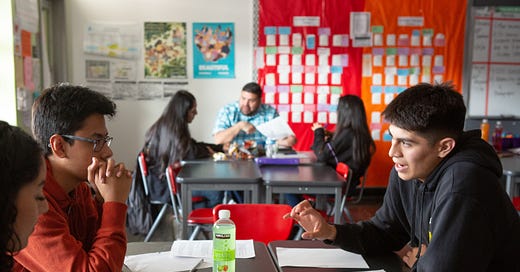February's Education Policy Hotlist
From accountability rollbacks to real investments in student success—what’s shifting in education and why it matters
Welcome back to the Education Policy Hotlist!
It’s been a wild month in education policy. As states scramble to redefine accountability in an era of declining achievement, new investments in evidence-based programs are emerging—while federal oversight continues to erode. Let’s dive into what’s changing, what’s working, and whether we’re truly centering students and their futures.
This Month’s Big Themes
📌 Accountability? What Accountability?
Virginia is being honest with parents about student outcomes. Their approach to closing the “honesty gap” between grades and actual learning is a lesson for Oregon. Read more
Meanwhile, other states are quietly walking back transparency. With NCLB-era protections gone and lowering standards, what happens next for state accountability? Read more
📌 Investing in What Works (Let’s go!)
Maryland is going all-in on high-dosage tutoring. This is the kind of serious investment in learning recovery that states should be making. Read more
Boston’s alternative high school model is proving what we already know: When students get the right mix of emotional support and rigorous academics, they thrive. This is exactly what we’re doing at Open School—pairing high expectations with strong relationships, academic support, and a belief in students' potential.
The takeaway? If we want disengaged students to re-engage, we need to stop pretending that compliance-based policies or low expectations will get them there. Read more
SEL is directly tied to literacy success. Research shows that strong social-emotional learning (SEL) support in Pre-K through Grade 5 improves reading outcomes. Read more
📌 Stop Pretending Cell Phone Bans Solve Learning Loss
New research says student engagement is about cognition—not phone bans. Schools are making a mistake if they think banning phones will suddenly turn students into better learners. Relationships, deep thinking, and clear instructional tactics work. Read more
📌 Trump’s Education Overhaul Is Happening—Here’s What It Means
Say goodbye to federal education research funding. Trump’s team is gutting the Institute of Education Sciences (IES), which means less investment in actual evidence—the very thing that should be driving school improvement and funding decisions. But here’s the real question: If more states were using this data to make meaningful improvements, would it be this easy to dismantle? Read more
The Office for Civil Rights is in the crosshairs. There's no backup plan if states don’t step up to protect students. My mantra today: In a time of regressive federal policymaking, state leaders must be bold. But let’s be real—this isn’t the first time we’ve been here. Remember when a global health crisis demanded leadership, and too many states sat back instead of stepping up? The consequences were devastating then and will be now if we don’t act. Read more
🗳️ Policy Moves to Watch
🚨 Iowa is pushing a career education bill (HSB 44) → Would create a statewide credentialing list for students but leaves out key equity protections. Read the bill here.
🚨 Missouri wants to expand its teacher externship program (HB 267) → Smart move! Giving teachers real-world industry experience can make career-connected learning more meaningful. Read the bill here.
🚨 New federal executive order on transgender athletes is creating legal and policy confusion in local school districts. This piece breaks down what’s at stake for local education agencies. Read more
📊 Must-Read Research
Education Finance Research Library: If you’re tracking school funding reform, this is the goldmine. Read more
California’s Local Control Funding Formula: A new report provides information about what was learned and what is next. This relevant far beyond California as many states review their funding formulas. Full Report | Two-page overview
Data Quality Campaign Statement on IES Cuts: Leading data-forward organizations respond to the Trump administration’s cancellation of IES contracts. Read more
We Keep Lowering the Instructional Bar —And It’s Hurting Students: Districts are making tough choices about budgets and staff, but ignoring teacher quality isn’t an option. This piece from NCTQ makes it clear: strong teacher evaluation systems help ensure great instructional leadership—yet in Oregon, we’ve largely avoided hard conversations about instructional quality and teacher support. Instead of strengthening professional development, investing in coaching, or using evaluation as a tool for growth, we’ve allowed weak and inconsistent systems to let instructional gaps persist. If we actually want to close learning gaps, we need to stop pretending this is just about funding and start addressing what happens inside the classroom. Read more
📅 What’s Coming Up?
Securing Our Competitive Edge: Education Innovation for a Stronger America
📍AEI, Feb 19 | Hosted by ALI | RSVP here
This briefing will dive into career-connected learning and education R&D—two things state agencies should be prioritizing.
Left Behind Screening & Dyslexia Panel at Cinema 21
📍Portland, OR | Details here
I’ll be on the panel discussing how local education agencies too often fail students with dyslexia and what we need to do about it.
🚨 Final Thought: Less Politics, More Results
This month made one thing clear: Too many education debates are political theater with no plan for student success. We can’t just throw money at the problem without a strategy or push restrictions like cell phone bans and call them a solution. The best policies invest in what works and hold our sytems accountable for results.
More soon. Until then, keep pushing for real change.
About Dr. Christine Toribio Pitts
Christine is an education policy leader, advocate, and interim President of Open School Inc., where she works to advance evidence-based strategies that improve outcomes for students and families in Oregon. With a background in teaching, research, and advocacy, she is committed to ensuring education policy and practice is driven by research, not rhetoric.
📩 Stay connected: Christine on Linkedin | The Education Policy Hotlist on Linkedin






thanks for pulling all of this together. i know it's a lot of work!